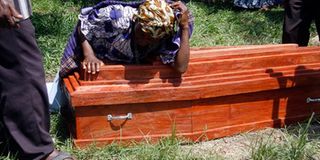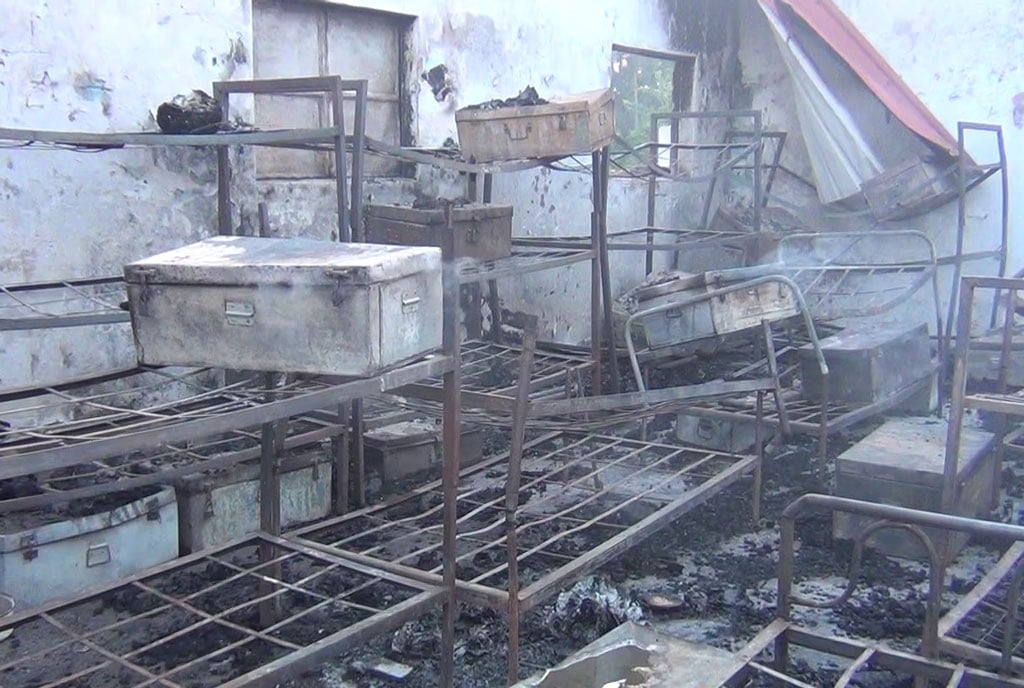Rwenzururu crisis: When the protector becomes the tormentor

A woman weeps on the casket bearing remains of her relative outside Kasese Municipal Health Centre III mortuary yesterday. PHOTO BY ABUBAKER LUBOWA.
What you need to know:
- This is a replica of the famous Buganda invasion by Obote in 1966.
- The aftermath and how Museveni and the Rwenzururu people, in particular the Bakonzo, will relate looks predictable.
November 27, will remain a black Sunday in the history of the Bakonzo, and the Rwenzururu Kingdom. With ambiguous allegations, the Ugandan military descended on civilians in the palace. A day before, at least eight civilians had been shot dead by the State at the Obusinga offices.
Eye witnesses recount how the military accessed the Obusinga offices through the rooftop, and pepper sprayed persons who had locked themselves in- shooting them upon exit. The attack also culminated in the humiliating arrest of His Majesty Charles Mumbere – after literally surviving death, and now faces a murder charge allegedly committed in March.
In some governments, violent and humiliating arrests are regular and thus not shocking. More horrendous is the barbaric killing by the State, in what precisely, is a genocide that ordinarily could have been avoided. “I saw it, I witnessed it; with my own eyes- I still can’t believe this is Uganda”, recounted Atkins Katusabe - the Member of Parliament for Bukonzo West, who was in the palace at the time. Katusabe narrated how he had assured the military leadership, of the king’s will to adhere to ‘terms and deadlines’ set by the President. What still baffles many is the urgency with which this dialogue was terminated in favour of a deadly assault.
What started as allegations on social media later turned out to be horrifying as gruesome pictures of heaps of dead men and women with hands tied were shared! It was a clear violation of human rights. It became apparent that a government with responsibility to protect life and property, had failed in its responsibility and instead engaged in destroying life and property. It is now clear that the State had several other options but chose invasion over dialogue; suggesting a predetermined mission to accomplish.
More disturbing is the way government spin machinery has taken control of information, passing to media and the unsuspecting public, sentiments that casts them in good light and the Kingdom as the enemy of the people. They have adopted several keywords – militia; terrorists, attackers, murderers, rebels, etc. Obusinga Bwa Rwenzururu exists legally, and criminalising the right to belong as embedded in the Ugandan constitution is an abuse of the rights and criminality in itself. The utterances from government are therefore a well-calculated attempt to cast the Obusinga in bad light as if it is an illegal institution.
For many years, the kingdom has worked with government, until the Kasese political terrain shifted towards Opposition that issues of a subversive kingdom started emerging. To Mr Museveni, partisan politics means opposition politics. As long as a cultural institution is promoting his agenda, that’s not partisan politics. Thus, King Mumbere’s troubles can be partially traced around his perceived denial of support to Mr Museveni.
Attacks on military facilities definitely happened as reprisals due to anger, and these attacks were not necessarily carried out by royal guards. It has now become a tall order for the State to create “evidence” – to the extent that now common home tools (machetes, spears) and a handful of rotten guns are being paraded. Again, many items displayed are also common royal regalia. One would also ordinarily expect a guard to possess some form of legally allowed equipment. This is not to however disregard the possibility of criminals among them. Several crime preventers, police and UPDF officers have committed crimes, including capital offences; but this does not imply the entire force is criminal.
This is a replica of the famous Buganda invasion by Obote in 1966. The aftermath and how Museveni and the Rwenzururu people, in particular the Bakonzo, will relate looks predictable. Government must guarantee the safety and security of the region. The needed healing requires an accountability mechanism on the part of the players in this crisis. The path to reconciliation and dialogue with Rwenzururu Kingdom and the community is the only best way forward. It is our hope that an independent commission is set up to investigate this horrendous incident. Those arrested should be produced in courts of law, for a fair trial.
Edwin Kamalha and Chripus Mayora co-authoured this article. They are residents of Kasese District.




